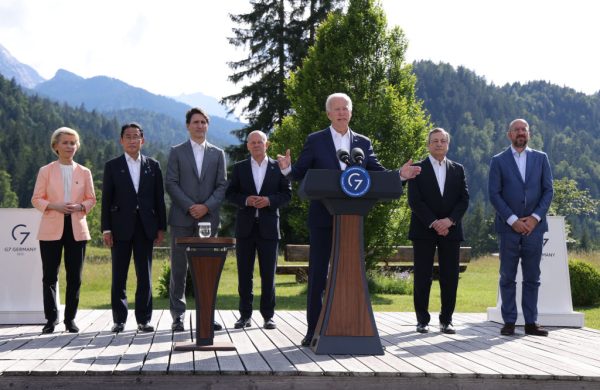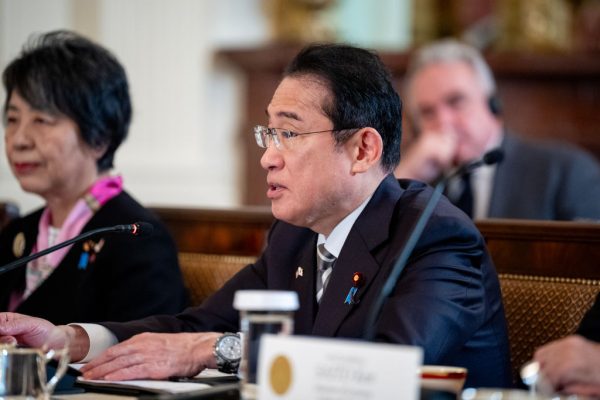In hopes of bolstering their military and economic relationship, U.S. President Joe Biden and Japanese Prime Minister Fumio Kishida held a joint press briefing on April 11 to underscore their commitment to countering China’s rising influence in the Indo-Pacific region.
This deepening of diplomatic ties was announced during Prime Minister Kishida’s visit to Washington, which included his attendance at a swanky state dinner. The comprehensive upgrade includes an expanded defense architecture, increased military exercises with other allies such as Britain and Australia, as well as significant economic and technological collaborations across more than 70 sectors.
‘Stronger than ever’
During the dinner, President Biden remarked, “We’ve been brought together with the same hopes, the same values, the same commitment to democracy and freedom and to dignity — dignity for all,” he said, adding, “And today without question, our alliance is stronger than it has ever been.”
“This is the most significant upgrade of our alliance since it was first established,” said Biden during a press conference in the White House Rose Garden following the dinner. The event saw the attendance of several high-profile figures, including actor Robert De Niro, former figure skater Kristi Yamaguchi, and Bill and Hillary Clinton.

The essence of the talks also touched upon the formation of a joint defense council aimed at promoting defense-related exports of equipment produced in Japan, signaling a move toward more integrated military operations.
Success
You are now signed up for our newsletter
Success
Check your email to complete sign up
RELATED:
- Japan Reverses Course, Increases Interest Rates for First Time in 17 Years
- US Seeks to Revive Dormant Shipyards With Help From South Korea and Japan
- Japan’s Daiwa House Planning US Factory for Prefab Homes
Furthering their cooperative front, the U.S. committed to including a Japanese astronaut in NASA’s upcoming Artemis mission. This inclusion not only symbolizes the trust and shared ambitions between the two nations, but also positions Japan as a prominent player in the next era of lunar and space exploration.
“Through Artemis, NASA will send astronauts — including the first woman, first person of color, and its first international partner astronaut — to explore the Moon for scientific discovery, technology evolution, economic benefits, and to build the foundation for crewed missions to Mars,” NASA said in a statement released on April 3.
Upgrading alliances
“The American alliance system has helped bring peace and stability to the Indo-Pacific for decades, and now we need to update and upgrade that alliance network for the modern age,” said White House National Security Advisor Jake Sullivan.
In addition to the strategic military and space engagements, both leaders also addressed broader geopolitical concerns — particularly the ongoing conflict in Ukraine. Kishida reiterated Japan’s staunch support for Ukraine, linking the European conflict to potential future scenarios in East Asia. “Ukraine today may be East Asia tomorrow,” he said.

READ MORE:
- US Puts Pressure on China as Ukraine War Escalates
- Ukraine Outnumbered, Outgunned in Face of Relentless Russian Onslaught
- Senate Republicans Expected to Block Border Package That Earmarks Billions for Ukraine and Israel
The state visit also provided an opportunity for both leaders to demonstrate unity in the face of potential political shifts at home. With the American presidential election on the horizon and the uncertain prospect of a return to power by former President Donald Trump, there was a palpable effort to cement a durable partnership.
An official, who chose to remain anonymous, noted that a phenomenon known as “anxiety in capitals” reflects how the international community will react depending on how the U.S. election turns out. Another official said that a “real risk” could reverse the progress made in U.S.-Japan relations if Trump was to secure the presidency.
“I think we all recognize that there is anxiety in capitals, uncertainty, about what the nature of the future of US policy will look like,” the official said, adding, “Whether we will remain as engaged in internationalist pursuits and the kinds of bipartisan foreign policy efforts which have animated the last period after the Second World War and after the Cold War. There are questions and concerns there.”
Not all smooth sailing
Despite the forward momentum between the two leaders, tension points remain, experts note. These include Biden’s reluctance to allow a Japanese firm to acquire a major U.S. steelmaker. The move, which struck some as “counterintuitive” to alliance-building principles, merits concern, says Joseph S. Nye Jr., an emeritus professor at Harvard. “The idea that you block the acquisition of a company by one of your closest allies makes no sense in alliance-building terms,” said Nye Jr.
Now, as the leaders prepare for further discussions — including a tri-nation meeting with Philippine President Ferdinand Marcos Jr. — the overarching goal remains clear: To solidify a cooperative stance against China that projects power and promotes stability across the Indo-Pacific.
“It goes way beyond security. It’s economics. It’s technology. It’s infrastructure development. And it’s diplomacy,” said Rahm Emanuel, U.S. ambassador to Japan. “And that’s all going to be on display in the meeting with the prime minister.”


















